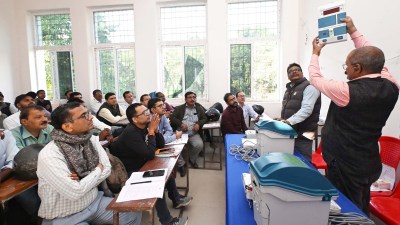Nepal puts foot down, Maoists take step back
With the Nepal government putting its foot down and refusing to concede any more ground to the Maoists, the Left-wing extremists today, in w...

With the Nepal government putting its foot down and refusing to concede any more ground to the Maoists, the Left-wing extremists today, in what many see here as a tactical move, withdrew their indefinite siege of the Valley ‘‘for a month’’ from tomorrow.
The week-long Kathmandu blockade was showing signs of easing yesterday when more than 70 trucks were pushed into the capital in the night and another 130 loaded trucks set off tonight from Raxaul with supplies to the Valley via Tribhuvan Raj Marg.
By giving a time-limit to the siege, the Maoists have sought a ‘‘face-saving’’ exit and yet keeping the threat very much alive.
Sources said the Maoists will watch Kathmandu’s moves on its promise to reveal the whereabouts of their jailed or missing comrades within a month. The Maoist decision was also prompted by the fact that the Royal Palace and the international community were determined to thwart the blockade.
Subodh Raj Pyakurel of the INSEC human rights group told The Indian Express that the Maoists had no option but to withdraw as they did not have the military capability to continue the siege for an indefinite period.
Pyakurel, who keeps in touch with Maoist leaders, said that another reason was New Delhi which New Delhi played a key role in ensuring that food supplies to the Valley and the RNA were not choked.
In fact, New Delhi plans to send another 34 mine-protection vehicles to Nepal over the next two months taking the total number to 100.
According to a press statement issued by the joint district committee of CPN-Maoist, the suspension of the blockade was a response to appeals from the human rights groups, businesses and the Nepali public.
While there is no word on lifting of the threat to 12 closed industries, including Soaltee Hotel and Surya Nepal, it is learnt that these units may open by the weekend as the Federation of Nepal Chambers of Commerce and Industry (FNCCI) has used the ‘‘good offices’’ of human rights activists such as Padma Ratna Tuladhar—who earlier brought the Maoists to the dialogue table—to persuade them to let the industries operate.
The Royal Nepalese Army (RNA) soldiers also came under fire from the Maoists at Sangha Chowk while trying to clear a road-block. RNA spokeperson Brigadier General Rajendra Bahaur Thapa said that additional troops had been sent to the site and the hunt for Maoists has been intensified on the Araniko highway that connects Kathmandu with Lhasa.
On August 18, the Maoists had forced road blockades in Makwanpur, Dhading, Nuwakot, Rasuwa and Sindhuplachowk districts demanding release of their cadres detained by security forces and investigation of what they call ‘‘extra-judicial killings.’’



- 01
- 02
- 03
- 04
- 05




























